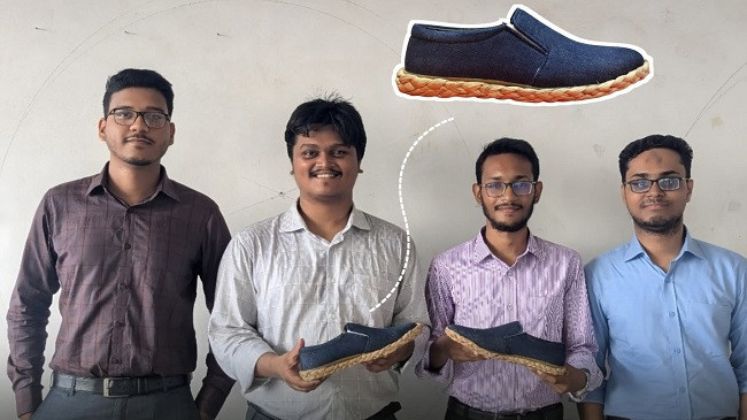
In a pioneering effort to promote sustainable fashion, four students from Bangladesh University of Textiles (BUTEX) have successfully created eco-friendly footwear using locally sourced cattails and discarded denim fabric. This innovative project marks the first such initiative in Bangladesh, highlighting the potential of green innovation in the country’s textile sector.
The shoes, dubbed ‘Eco-Step,’ are crafted from materials that are typically considered environmental problems. The insole is made from braided Kachuripana (cattails), a plant now common in Bangladesh’s water bodies, which was introduced from the Amazon rainforest in Brazil in 1884. Over time, this invasive species has proliferated rapidly, causing oxygen depletion and harming aquatic ecosystems.
Complementing the insole, the outer shell of Eco-Step is fashioned from recycled denim waste, produced globally in vast quantities from the manufacturing of jeans and jackets, most of which ends up in landfills, contributing to environmental degradation. Globally, approximately 2.16 million metric tons of denim waste are generated annually.
The project was undertaken by students Tashfiq Hossain, Arnab Halder Abhi, Fardin Bin Monir, and Annoy Debnath from the Textile Engineering Management Department, under the supervision of Associate Professor Dr. Marzia Dulal. Developed in the Product Development Lab at BUTEX, the shoes utilise a hand-crafted braided weave technique. The students dried and braided the Kachuripana stems into durable strands, which form the shoe’s sole and serve as decorative laces, adding a natural aesthetic to the footwear.
“The uneven structure of the braided Kachuripana not only makes the shoes environmentally friendly but also provides comfort for the wearer,” the team explained.
Designed to be both functional and sustainable, Eco-Step shoes are durable with a lifespan of up to a year and can be extended to 2-3 years with chemical treatments. Once discarded, their biodegradable materials decompose within 10-12 months, returning nutrients to the soil without harming the environment.
Cost-effective to produce at just Taka 400–500 per pair, Eco-Step offers an affordable alternative to existing eco-friendly footwear options. The initiative exemplifies how local resources and innovative thinking can address global ecological challenges, such as water pollution and textile waste.
This project underscores Bangladesh’s growing emphasis on green innovation within its textile and fashion industries. With further support and scaling, Eco-Step has the potential to become a commercially viable product, promoting a circular economy while offering eco-conscious consumers an affordable sustainable footwear choice.






